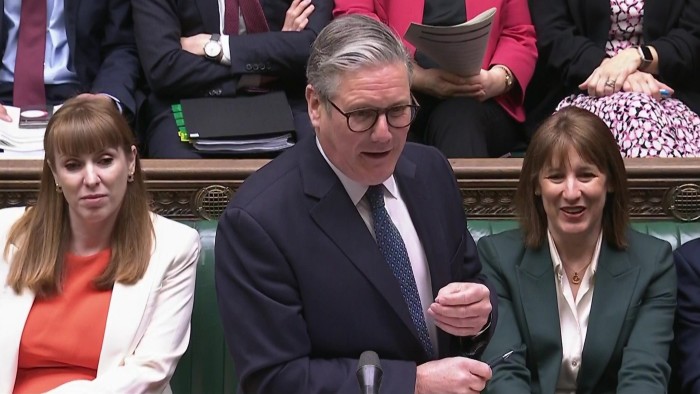Unlock the White House Watch newsletter for free
Your guide to what the 2024 US election means for Washington and the world
Prime Minister Sir Keir Starmer said a “trade war is in nobody’s interests” as he vowed to take a “cool-headed” approach to US President Donald Trump’s imposition of tariffs on Wednesday evening.
“We will take a calm, pragmatic approach,” Starmer said during Prime Minister’s Questions on Wednesday afternoon. “We have prepared for all eventualities and we have ruled nothing out.”
Starmer also insisted that “constructive talks are progressing between the UK and the US about a potential economic deal” that he hoped would soften trade tariffs imposed on Britain.
As part of the negotiations the UK has offered to scrap or scale back its digital services tax, which imposes a 2 per cent tax on the revenues of some of the biggest tech companies in the world, including US giants Google, Amazon and Microsoft.
Liberal Democrat leader Sir Ed Davey called on Starmer to work with the EU and other allies to develop retaliatory measures, in what he called an “economic coalition of the willing”.
But Starmer insisted it was “important at a moment like this that we don’t have knee-jerk reactions” and that the UK was “cool-headed”.
He added: “I really do not think it’s sensible to say the first response should be to jump into a trade war with the US.”
Speaking at the Treasury select committee, chancellor Rachel Reeves said there would not be any rush to respond to Trump’s tariffs, given the UK’s continuing efforts to strike an economic deal with the US.
She added that she had spoken to European economics commissioner Valdis Dombrovskis as part of discussions with other countries and the EU on how to respond.
Recommended
“We don’t want to be posturing here,” said Reeves. “The prize on offer is a good economic agreement between us and the US.” This meant “we don’t want to get ahead of ourselves” by rushing into action to get a “quick headline”.
Reeves reiterated her desire to see lower trade barriers in general, and warned that the UK could be hit by the wider global fallout from the tariffs irrespective of any specific arrangements struck between the US and UK.
Even if there is an agreement with the US, Reeves said, “that doesn’t mean somehow we are out of the woods and not impacted by tariffs”.
Conservative leader Kemi Badenoch said on Wednesday she had urged Starmer to accept the draft trade deal she had negotiated with the US when the Tories were in office, and accused Labour of having plunged the UK’s “car industry in crisis even before tariffs”.
The US is a major export market for many of the UK’s upmarket and luxury auto brands, including Bentley, Rolls-Royce and JLR’s Range Rover nameplate.
Northern Ireland — which has remained in the EU’s single market for goods under a post-Brexit trading deal — could be hit if the EU imposes retaliatory tariffs on the US but the UK does not follow suit.
Gavin Robinson, leader of Northern Ireland’s biggest pro-UK party, the Democratic Unionist party, urged Starmer to “take steps to exempt Northern Ireland” if that happened.
Starmer said the issue was “very serious” and “the interests of Northern Ireland are at the forefront of our decisions”. Jonathan Reynolds, UK business secretary, spoke to the Northern Ireland Executive earlier, he added. The executive had no immediate details of their talks.
Recommended
“We are looking carefully at the details of any retaliatory tariffs announced by the EU if they are and what impact they might have on businesses,” Starmer told parliament.
“When goods do not enter the EU, businesses can claim a full reimbursement of any EU duties paid,” he added. However, businesses say this route is slow and cumbersome.
Some business lobbyists involved in trade talks with Washington believe Britain could eventually face baseline tariffs of 10 per cent to 15 per cent, while the EU would have to pay equivalent tariffs of between 20 per cent and 25 per cent.




